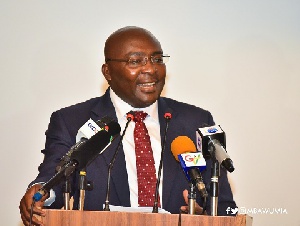 Vice President Dr. Mahamudu Bawumia
Vice President Dr. Mahamudu Bawumia
Vice President Dr Mahamudu Bawumia said for the banking system to transform, there is the need to roll out national identification database to uniquely identify individual in the country.
He said the database had become imperative in view of the high-interest rate of banks, which was hovering around 31 and 29 per cent and crippling many businesses.
He said the situation had been created due to the banks’ inability to easily identify persons by where they live, thereby compelling them to offer loans at a higher risk premium.
At the launch of the 55th Anniversary of the National Investment Bank (NIB) in Accra on Monday, Vice President Bawumia said the National Identification System would be rolled out in the next couple of months to identify every Ghanaian and facilitate business transactions whilst creating conductive environment for accessing loans.
He said the move would also help in the compilation of database for the National Voters Register, National Health Insurance Scheme and Driver and Vehicle Licensing Authority to facilitate the work of banks in tracking lenders.
The Anniversary was on the theme: “55 Years of Growing Ghanaian Businesses,” which would involve activities like public lectures, health walk and fun games, as well as dinner dance, awards night and thanksgiving service.
Vice President Bawumia was assisted by Mr Ken Ofori-Atta, the Finance Minister, Togbe Afede XIV, the Board Chairman of the Bank and Dr John Kweku Asamoah, the Managing Director of the Bank, to unveil the logo for the celebration.
The Vice President said the NIB had played a prominent role in the country’s development efforts by supporting many businesses and institutions to stand on their feet.
He shared in the joy of the Bank for its recent success at the Supreme Court and commended the Board and Management for their steadfastness throughout the duration of the trial.
Fifty-five years in banking had been quite challenging but the NIB had been able to stand the test of time, he said.
“Our hope and prayer is that the banking environment, which you find yourselves in, would in the next 55 years be very different from the environment we have been pursuing in the past 55 years,” he said.
The NIB was established on March 22, 1963 by Ghana’s First President Osagyefo Dr Kwame Nkrumah as a development bank to offer financial support to businesses.
The Bank currently has 52 branches and agencies across the country and expected to open three new branches by the end of this month.
Vice President Bawumia said government would launch the Interoperability of the Payment System in a few months’ time to provide a vehicle for everybody to be financially inclusive.
“The mobile network operators would be completely interoperable with the banks and you can move your monies seamlessly from your bank account to your mobile money wallet, “he said.
On measures to speed-up land title registration, he said a Land Working Group had been established after the recent Land Administration Conference and tasked to come out with a mechanism to register land titles within seven days.
This way, there would be a process to uniquely identify every inch of land in the country for registration and that land data would be digitised so that anyone interested could easily check the ownership of land electronically, which would go a long way to prevent multiple sale and fraud.
In October this year, Vice President Bawumia said government would undertake Base Mapping for land whereby all the database on lands would be scanned and digitised to make it easily accessible to facilitate business transactions and support the mortgage market.
Dr John Kweku Asamoah, the Managing Director of the Bank, in his welcome address, said 55 years was worth celebrating as it was an opportunity to take stock and chart the way forward.
He said the Bank had undergone institutional, managerial and financial restructuring over the years, which had made it a formidable force in the banking industry.
“Four years ago, NIB was almost a lost brand in the industry. In 2015, the Bank set one main objective, which was to turn around the fortunes of the Bank and make it more profitable.
“We set out to restore hope among our shareholders, regulators, customers, service providers as well as employees,” he said.
In that regard, Dr Asamoah said, the Bank instituted a three-year strategic plan from 2015-2017 to fast-track growth and to stay competitive and meet customers’ expectations.
He said the Plan had chalked tremendous successes, which was evident by a stronger brand in the banking industry.
“The future of the Bank is very bright and exciting, and we will continue to develop products to meet customers’ expectations with the view of maximising value for our shareholders,” Dr Asamoah said.